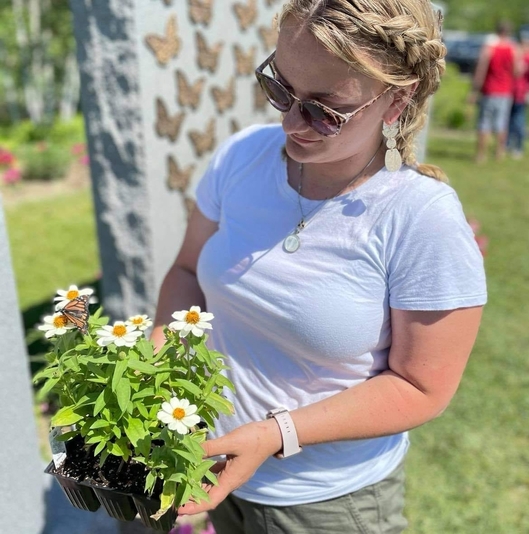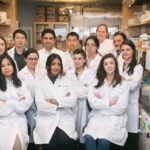A legend for Zora: How genomic testing provides answers in the face of grief

So often after a perinatal loss, parents are left with uncertainty about what caused their baby’s death and the haunting question, “what if.”
To help grieving families find answers to these questions, Dr. Monica Wojcik and her colleagues in the Division of Newborn Medicine are conducting genomic autopsies to learn if and what genetic factors may have been involved.
After a baby passes away, or even while they are in the neonatal intensive care unit, DNA samples are collected from the infant or the placenta. Dr. Wojcik’s team at Boston Children’s Hospital then sends the sample to the Broad Institute for genetic sequencing and provides results to the families with the assistance of hospital genetic counselors.
“The information we find through genomic autopsies not only provides great relief to parents,” says Wojcik. “It also helps them understand any future genetic risks if they plan on growing their families.”
Mary and Jeremy Spreng of Maine are one of these families.
A move for hope
Mary’s 20-week prenatal anatomy scan showed abnormalities in her daughter, Zora’s, kidneys.
“Her kidneys were larger than they should have been and super bright,” Mary recalls, referring to Zora’s prenatal ultrasound. “I was told that findings like these typically indicate a kidney condition.”
Another concern was Mary’s low amount of amniotic fluid. Amniotic fluid is critical to a baby’s development. Among other important functions, it’s what they breathe to help their lungs mature in the womb.
Because of these findings, Mary’s obstetrician recommended she come to Boston for specialized fetal care services, which included multidisciplinary consultation by Dr. Wojcik well as Dr. Deborah Stein, nephrologist.
Being in Boston would also give Zora access to a neonatal intensive care unit (NICU) once she was born to receive highly specialized care, including kidney dialysis. Dialysis is a process that removes excess water and toxins from the blood when the kidneys can’t perform these functions on their own.
The Maternal Fetal Care Center at Boston Children’s Hospital works closely with the neonatologists and maternal-fetal medicine specialists at Brigham and Women’s Hospital to provide newborns and their families with specialized pediatric care.
In January, Mary and Jeremy moved into hospitality housing to be closer to Brigham and Women’s Hospital, where Mary would deliver.
In addition to being away from family and friends, the COVID-19 pandemic required extensive hospital safety protocols that kept Jeremy from going to Mary’s prenatal appointments.
Despite their isolation, Mary and Jeremy say Dr. Wojcik, Dr. Stein, and the Maternal Fetal Care Center team, including Tabitha Poorvu, a genetics counselor, and Kassie Merrill-Olver, a social worker, were a great sense of comfort.
“They held our hand through everything,” Mary says. “They were constantly talking to us through email or phone calls.”
The couple also credits their teams at Brigham and Women’s for getting them through their time away from home.
Honest answers
Zora Grace arrived March 1.
“She was really cute,” Mary says. “She looked like a perfect little baby. You would never know she was so sick.”
DNA samples were collected from Zora’s cheek and umbilical cord soon after her delivery for genetic testing, which was sent clinically through Brigham and Women’s.
Because her lungs were underdeveloped, Zora was placed on a high-capacity ventilator to help her breathe. The hope: for her to grow strong enough to tolerate dialysis.
Mary and Jeremy say their care teams at both Boston Children’s and Brigham and Women’s were honest and respectful when discussing the fight Zora would have ahead of her.
“They told us there was a good chance that she could pass away,” Jeremy says, “We just hoped that she would be in that small percentage (of patients) who make it to dialysis. But her lungs just weren’t developed enough. And her kidneys weren’t functioning to the capacity that they needed.”
Zora died March 10.
Mary and Jeremy will treasure the small window of time they had together as a family of three.
“We had our last afternoon as a family,” Jeremy recalls. “We got to sit on the porch and hold her and watch the sunset.”
“We got to just be present with Zora,” Mary says. “That was huge.”
A tool to help heal
Mary and Jeremy received the official results of the genomic testing a few days after Zora’s death. Their daughter had had Pierson syndrome, a rare genetic condition that most often leads to kidney failure.
“The results of Pierson syndrome just confirmed that the choice we made to remove Zora from the ventilator was the right one,” Jeremy says. “Her chances of survival were so low.”
This confirmation is one of the main goals of Dr. Wojcik’s work.
“Our hope is that we can provide families with some consolation,” says Dr. Wojcik. “And comfort in knowing that the condition their child faced was likely not treatable or curable.”
In addition to giving families answers about their baby’s death, Dr. Wojcik hopes that the work she and her team are doing will help inform the clinical management of these tragic losses and uncover strategies to prevent them. For families unable to receive a genetic analysis through clinical testing, she hopes that her research analysis will provide information that may guide them in IVF and pre-implantation genetic counseling should they plan to become pregnant again.
Honoring Zora
To honor Zora, and empowered by the knowledge that genetic testing gave them about their own hereditary risk, Mary and Jeremy are lending their voices to the fight to have IVF, pre-implantation genetic counseling and other fertility services covered by private insurance companies in the state of Maine.
“We want to share our story as much as we can,” Mary says. “Sharing our story helps us heal a little bit.”
Learn more about how the Division of Newborn Medicine and Maternal Fetal Care Center at Boston Children are helping babies critically-ill infants requiring complex medical and surgical care.
Related Posts :
-

'Finally in the right place': Peyton’s journey to Boston
When Peyton Miklas comes to Boston Children’s Hospital for an appointment, she isn’t just seeing Dr. Belinda ...
-

Solving genetic mysteries – in the NICU and beyond
A growing number of children with suspected genetic disorders are having their complete exomes sequenced, since it’s now often ...
-

Making genome sequencing a first-line test in rare disease
Children with rare diseases often undergo years of medical visits and genetic testing before they get a diagnosis. Over the ...
-

Two rising stars in kidney genetics: Nina Mann and Amar Majmundar
A healthy, functional kidney must maintain a delicate balance of water, nutrients, and electrolytes so it can properly filter the ...





